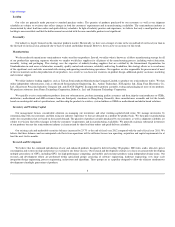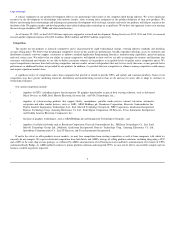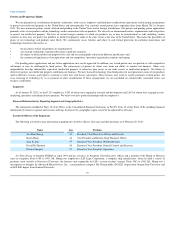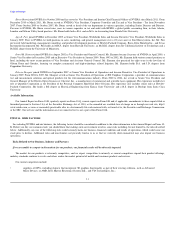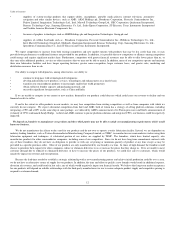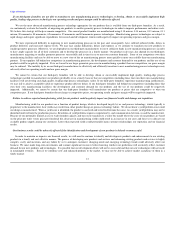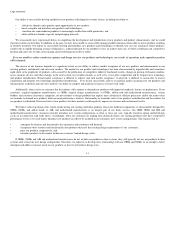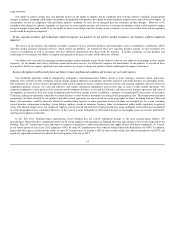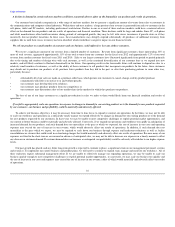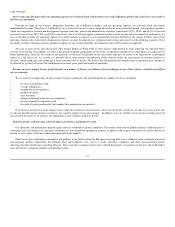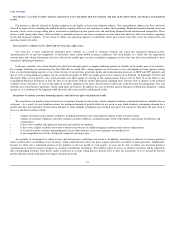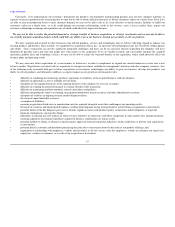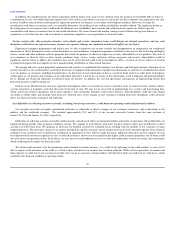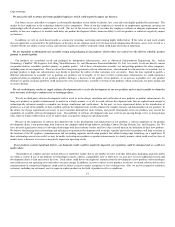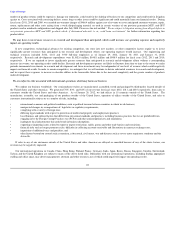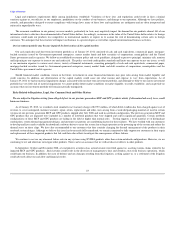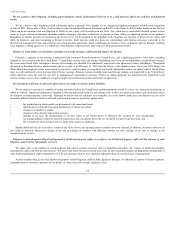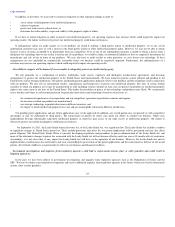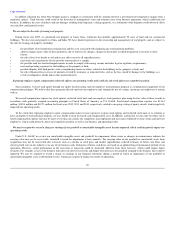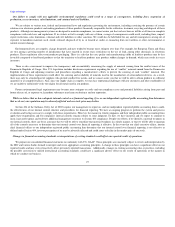NVIDIA 2012 Annual Report Download - page 18
Download and view the complete annual report
Please find page 18 of the 2012 NVIDIA annual report below. You can navigate through the pages in the report by either clicking on the pages listed below, or by using the keyword search tool below to find specific information within the annual report.
Table of Contents
Our revenue may fluctuate while our operating expenses are relatively fixed, which makes our results difficult to predict and could cause our results to
fall short of expectations.
Demand for many of our revenue components fluctuates and is difficult to predict, and our operating expenses are relatively fixed and largely
independent of revenue. Therefore, it is difficult for us to accurately forecast revenue and profits or losses in any particular period. Our operating expenses,
which are comprised of research and development expenses and sales, general and administrative expenses, represented 35.2%, 32.6% and 38.3% of our total
revenue for fiscal years 2012, 2011 and 2010, respectively. Since we often recognize a substantial portion of our revenue in the last month of each quarter, we
may not be able to adjust our operating expenses in a timely manner in response to any unanticipated revenue shortfalls in any quarter. Further, some of our
operating expenses, like stock-based compensation expense, can only be adjusted over a longer period of time and cannot be reduced during a quarter. If we
are unable to reduce operating expenses quickly in response to any revenue shortfalls, our financial results will be negatively impacted.
Any one or more of the risks discussed in this Annual Report on Form 10-K or other factors could prevent us from achieving our expected future
revenue or net income. Accordingly, we believe that period-to-period comparisons of our results of operations should not be relied upon as an indication of
future performance. Similarly, the results of any quarterly or full fiscal year period are not necessarily indicative of results to be expected for a subsequent
quarter or a full fiscal year. As a result, it is possible that in some quarters our operating results could be below the expectations of securities analysts or
investors, which could cause the trading price of our common stock to decline. We believe that our quarterly and annual results of operations may continue to
be affected by a variety of factors that could harm our revenue, gross profit and results of operations.
Because our gross margin for any period depends on a number of factors, our failure to forecast changes in any of these factors could adversely affect
our gross margin.
We are focused on improving our gross margin. Our gross margin for any period depends on a number of factors, including:
• the mix of our products sold;
• average selling prices;
• introduction of new products;
• product transitions;
• sales discounts;
• unexpected pricing actions by our competitors;
• the cost of product components; and
• the yield of wafers produced by the foundries that manufacture our products.
If we do not correctly forecast the impact of any of the relevant factors on our business, there may not be any actions we can take or we may not be able
to take any possible actions in time to counteract any negative impact on our gross margin. In addition, if we are unable to meet our gross margin target for
any period or the target set by analysts, the trading price of our common stock may decline.
Global economic conditions may adversely affect our business and financial results.
Our operations and performance depend significantly on worldwide economic conditions. Uncertainty about current global economic conditions poses a
continuing risk to our business as consumers and businesses have postponed spending in response to tighter credit, negative financial news and/or declines in
income or asset values, which have reduced the demand for our products.
Other factors that could depress demand for our products in the future include the European sovereign debt crisis, conditions in the residential real estate
and mortgage markets, expectations for inflation, labor and healthcare costs, access to credit, consumer confidence, and other macroeconomic factors
affecting consumer and business spending behavior. These and other economic factors have reduced demand for our products in the past and could further
harm our business, financial condition and operating results.
17



